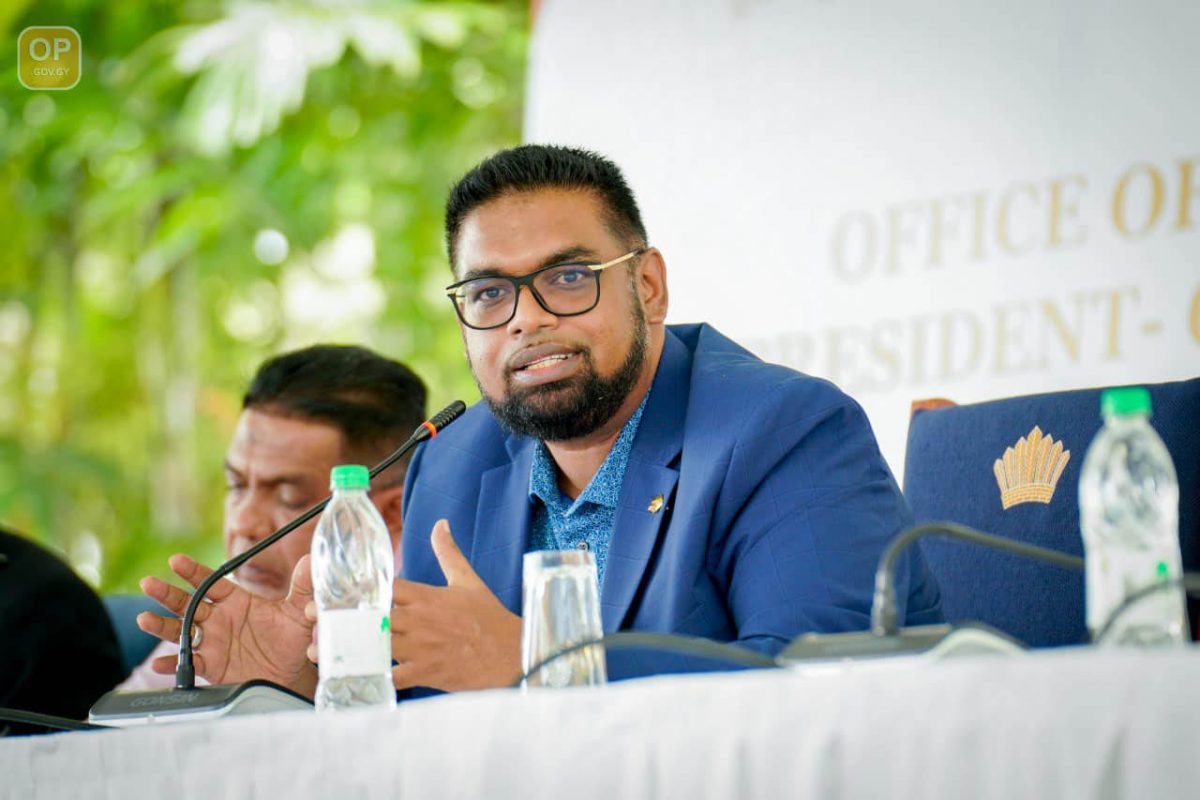President Irfaan Ali has stressed that no CARICOM country raised the issue of Guyana’s Local Content Legislation potentially being in violation of the Treaty of Chaguaramas when heads of state from the region met in Belize earlier this month.
A representative from the Caribbean Private Sector Organization (CPSO), which was blistered by the local private sector, even tried to explain that they also did not have an issue.
“There was no issue raised by any of the heads of Guyana’s local content legislation. I want it to end there,” the President stressed.
“In no way, shape or form, was anyone critical of Guyana’s local content legislation,” Ali told a press conference when asked about the body’s views on the issue.”
“For a matter of fact, the man [President] from CPSO sought to take time to explain that they did not make any decision, they were just discussing and this email just escaped by some formulation,” he added.
Guyana’s Private Sector Com-mission and business persons blazed the CPSO following leaked email from the organisation which revealed that it was of the view that the recently passed Local Content Act might in parts violate the CARICOM-founding Treaty of Chaguaramas and it would therefore approach the government here and CARICOM on the matter.
Head of the Guyana Oil and Gas Energy Chamber, Manniram Prashad had even met with CARICOM Secretary General Dr Carla Barnett and asked that the regional body de-recognise the CPSO.
The email was distributed by CPSO Chairman Gervase Warner who also happens to be the President and CEO of the Trinidad-based Massy Group.
Persons the email was sent to include John Williams of Barbados’ Cave Shepherd, Paul Scott of the Musson Group of Jamaica, William Mahfood of Jamaica’s WisynCo Group, Christian Mouttet of Prestige Holdings of Trinidad and Tobago, Andrew Sabga of Trinidad and Tobago’s ANSA McAl, Anthony Ali of Goddard Enterprises Limited of Barbados, Warsha Torial of Rudisa, Brian Jardim of Rainforest Seafoods, Gordon Charles of the JQ Charles Group, Karen Polack of Face Commodity, Trisha Tannis of Unicomer Barbados, Thackray Driver of TT’s Energy Chamber, and Suresh Beharry of the Beharry Group of Companies.
On January 13, the PSC blasted the CPSO, “The PSC questions the legitimacy of the CPSO which constituency consist of some Pan Caribbean companies (and notes) that the organisation does not represent the interest of the local private sector”, a statement from the PSC had said. The PSC noted that the purpose of Local Content straddles countries, regions, and continents, and forms an integral part of the Petroleum Sector. “The PSC wishes to note, in fact, that Trinidad and Tobago has had in place for more than 50 years, a regime of local content “predicated on maximising citizens’ ownership, control and financing of all activities along the energy resources sector” thus giving preference to Trinidadians.
“The Commission is satisfied that the policies expressed in Guyana’s Local Content Act are not dissimilar to those of Trinidad and Tobago’s and do not violate the revised Treaty of Chaguaramas. We therefore stand by and fully endorse the aims and objectives of the Act which are designed to ensure that Guyanese companies and nationals benefit from the Oil and Gas sector. The PSC welcomes foreign investors and urges respect for the country’s laws and sovereign space”, the private sector statement said.
Hours earlier, the CPSO issued its own statement aimed at damage control while maintaining that it would be approaching the government here and CARICOM on the local content act. It also emphasised that the concerns raised reflect the views of the CPSO and not that of any specific member company. That statement appeared aimed at the fact that Massy has major holdings in Guyana and there had been criticisms levelled at it in the aftermath of the leaking of Warner’s email. In the statement, the CPSO said its attention has been drawn to numerous exchanges in the Guyana media on routine internal communication emanating from the CPSO Chairman after the CPSO Executive Com-mittee Meeting of January 11th, 2022.
“Unfortunately, that communication appeared to have been leaked without the benefit of any explanation of context and intent. As is sometimes the case when such leaks occur, there has been much misinterpretation and misrepresentation”, the organisation said.
It added that CPSO Director Suresh Beharry of the Beharry Group of Companies was requested to facilitate a meeting between the CPSO and the Office of the President of Guyana to discuss the sensitive issue. This revelation which was contained in the leaked email led to its own fallout after a statement was issued on Beharry’s behalf emphasising his support for the Local Content Law.
Ali said that given that the issue did not come up, he did not want to “make an issue where there was none.”
He said that he was confident in this country’s new law and was not worried that later on, a sunrise country as this would be pressed to revise its provisions.
“Trinidad and Tobago has had their Local Content Policy and they have been in the oil and gas sector for close to 100 years. I don’t see any threat to our local content law. I think you would see more participation [from the region],” he said while added that from the resource here “the region must prosper.




